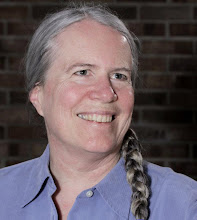Religious Community
Chuck Lippy gave a talk here last night on "Challenges to American Protestantism in the Twenty-First Century." One of his points was that while a poll shows that people believe that spirituality will have an increasing effect on public life in this century, that spirituality is increasingly invidualistic. Not only do we easily change denominations, we also pick and choose individual practices that suit us (Christian yoga, anyone?). Mainline denominations less and less define what their members do or even believe.
I'm back again in the same place about community. I do pick and choose--since I was baptized at age 27 I have been a member of the United Church of Christ, a Presbyterian (USA), and an Episcopalian. My spiritual practices include icons and the labyrinth, which are both fairly popular in the Episcopal church but not part of an Episcopalian tradition.
AKMA, in his earlier post on community, defined the religious community as: "a body of people big enough to damp out individual idiosyncrasies." In a comment on AKMA's post Tom Matrullo asked "First, exactly what is delimited in the metaphor of "damp out" - is this an extinguishing, a mellowing, a sponging that removes or just leaves less damp?, or a mollifying, a pacifying, a modulating, a form of bondage by bonding, a bringing to its senses, a softening, or something else?"
I think AKMA is right that institutions do good by damping individual experience (as One Pot Meal acknowledges in talking about academia). I would like to trust an institution to provide balance, discernment, and that experience of not being alone. But I can't imagine giving up the right to pick what I want from a cafeteria of lots of different traditions. Is there some way to hold those opposites in creative tension?


No comments:
Post a Comment